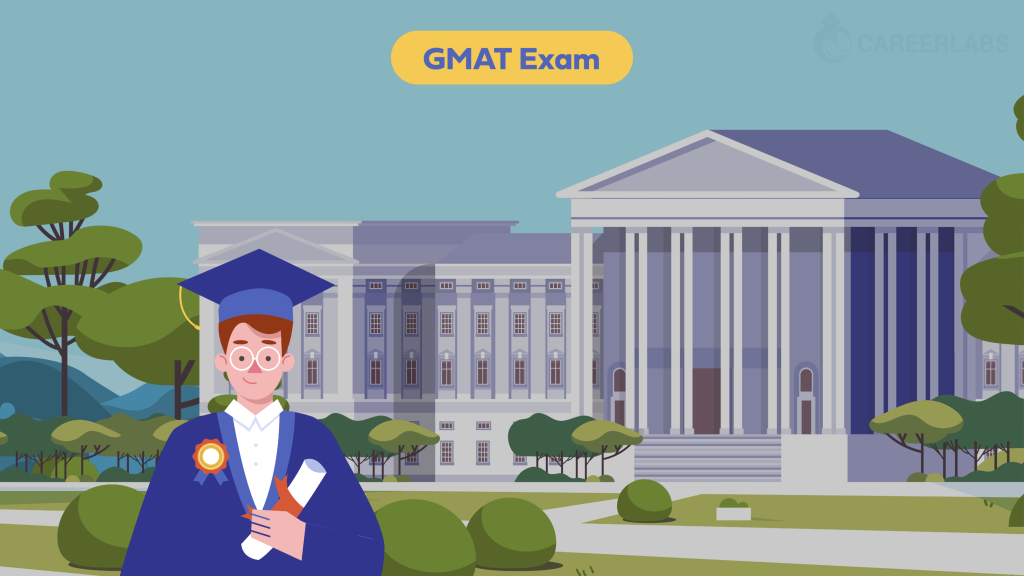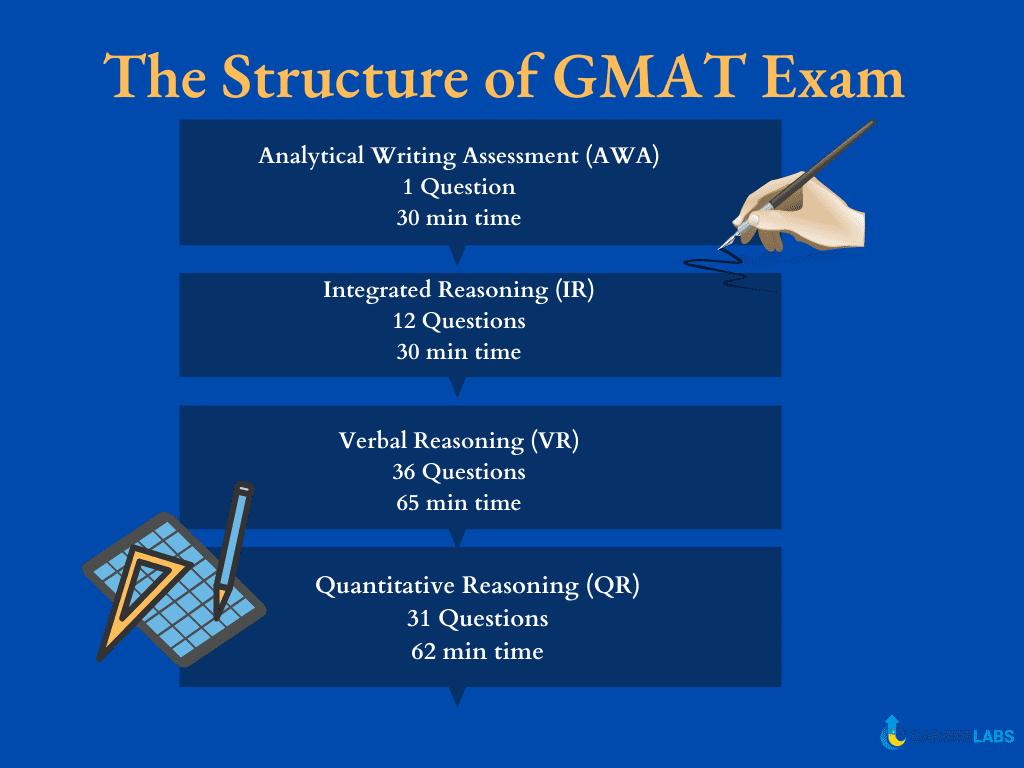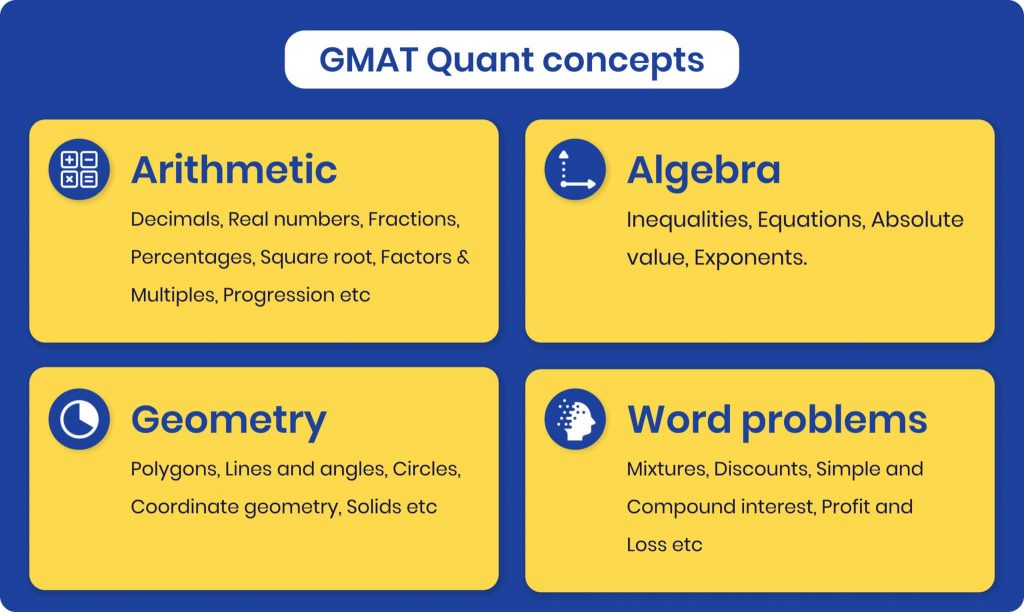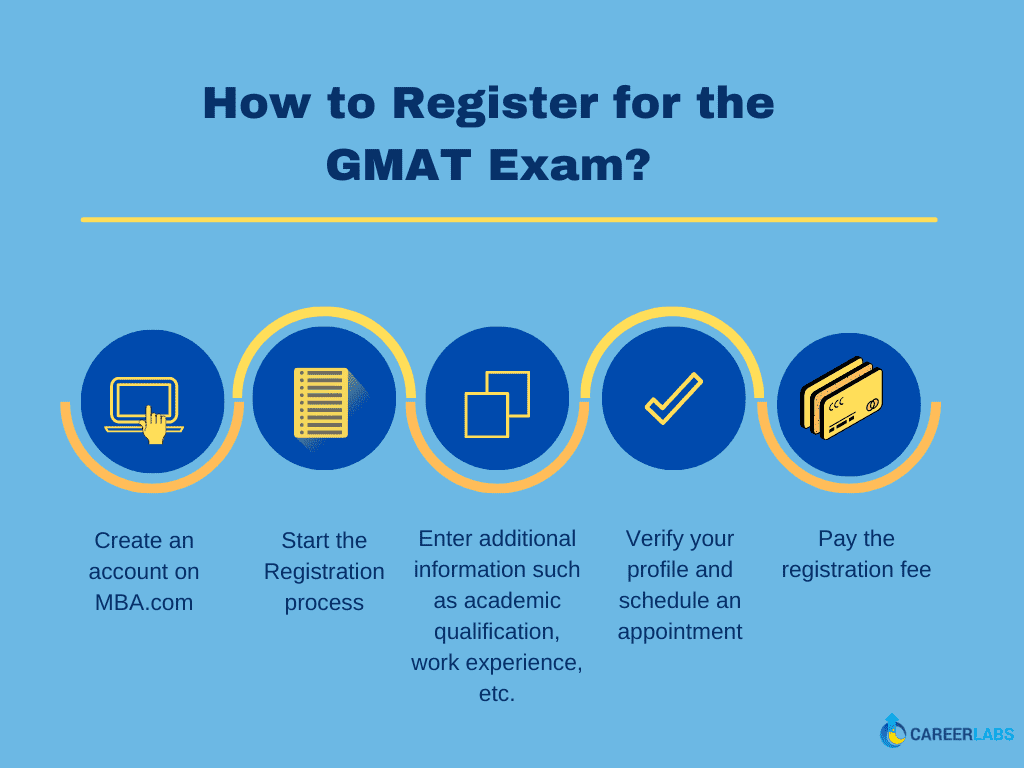
What is GMAT?
GMAT is a 3.5 hours long business school entrance exam. Students and working professionals who aspire to pursue an MBA from b-schools in India or abroad choose to take GMAT. Every year, around 200,000 candidates take the GMAT exam. More than 7,000 graduate programs at 2300 universities accept GMAT scores. Hence, if you want to make it into the top colleges, you need to achieve a GMAT score of around 700+ with 800 being the highest score. You even have the freedom to take the exam more than once if you are not satisfied with your scores or want a much better score to enter into a college/university of your choice. A stellar GMAT score demonstrates your commitment, motivation, and ability to work hard and, in turn, succeed. GMAT Verbal Reasoning: Critical Reasoning Questions & Solutions| Table of Contents |
What is GMAT Used For?
Most business schools consider GMAT as a parameter to check whether you have the necessary skills to excel in the business programs they offer. Your performance in the test proves that you are capable of learning the rigorous syllabus of an MBA course and thus improves your chances of securing an admission to the b-school of your choice.Recent Updates by GMAC
Recently, the GMAC introduced several enhancements to both the online exam as well as the test-center exam. These changes came into effect on May 20, 2021. Some of these changes are as follows:- You can use an Aadhar card as ID proof for registration. However, this is applicable only for the GMAT online exam.
- You get your unofficial scores immediately after the exam.
- You can select the order of the questions based on your preference (for online exams only).
Why GMAT?
As mentioned earlier, GMAT is an integral admission prerequisite for graduate management courses. Having said that, the benefits of the GMAT are not limited to getting admissions only; your performance in the GMAT can help you get good jobs and internships as well. In the section below, we have listed out the ways in which taking the GMAT can be helpful.- Improves your chances of getting admissions to top b-schools – A high score in the GMAT test improves your chances of getting admission to a business school of your choice. Most prestigious global b-schools accept GMAT scores. Besides, a lot of Indian b-schools accept GMAT scores now. This is because the GMAT scores prove your knowledge and capacity to learn. However, all the other components of the applications such as personal essays, work experience, SOP, etc are subjective.
- Qualifies you for merit-based scholarships – MBA education can be extremely expensive. Though there are multiple ways to fund your management education such as by way of taking loans, etc. Among all, scholarships are the best way to fund your education. Most scholarships are merit-based, which means you are eligible to apply for scholarships, only if you prove to be exceptional in your studies. Having a strong GMAT score can certainly help you here. A great GMAT score is one way to demonstrate that you’re an excellent candidate.
- Better job opportunities post-MBA – If you are a candidate who achieved a stellar score on the GMAT, you are most likely to get into a top business school to pursue your MBA. Once you complete your MBA from top institutes, you are more likely to get a highly rewarding job.
Is GMAT Hard?
The Quantitative and the Verbal sections of the GMAT are computer-adaptive. Both the sections start with medium questions. However, as the test progresses, the difficulty level of the questions change based on your answers to the previous questions. The more right answers you get, the harder the next set of questions will be. Besides, there is a time limit for every section, and you are supposed to finish that section within the given time. Also, though GMAT questions are based on basic skills, the way the questions asked can be tricky. The time pressure, the changing difficulty level, and the tricky way of asking questions makes the GMAT, a challenging exam.GMAT Exam Structure
It is imperative that you know the GMAT exam details, especially structure of the Exam as it helps you create a good preparation strategy and a proper study plan. Besides, this will help you learn time-management strategies. The GMAT exam duration is 3 hours 30 minutes, including two 8-minutes optional breaks. No, let us look into the structure of the GMAT paper. The paper consists of four sections — Quantitative Reasoning (QR), Integrated Reasoning (IR), Verbal Reasoning (VR), and Analytical Writing Assessment (AWA).
A meticulous analysis of these sections will acquaint you with the question types and the skills you need to solve the following sections.
1 . Analytical Writing Assessment – The Analytical Writing Assessment section or GMAT AWA consists of one Essay-writing task. Here, you need to critique a given argument and communicate your ideas through an English essay. The argument topics could be related to any subject of general interest. However, specific subject knowledge of the essay topic is not mandatory, as the section only measures your ability to critically analyze the given topic and express your ideas with clarity.
2 . Integrated Reasoning – Integrated Reasoning is designed to measure your ability to evaluate data presented in multiple formats (graphs, tables, or texts)— and derive meaningful conclusions from them. You need to use your critical thinking and logical reasoning skills to solve 12 questions in 30 minutes from this section of the exam. The questions are of four types:
- Multi-Source Reasoning – Multi-source Reasoning measures your ability to examine data from multiple sources — such as passages, tables, graphics, or the combination of the three. The data is followed by multiple questions and answer choices. To answer these questions, you must analyze each source of data carefully.
While some questions require you to determine whether the provided data is relevant to answer the questions, others may ask you to recognize discrepancies between the formats of data or draw inferences from them.
- Graphics Interpretation – Your ability to interpret the information presented in graphical formats (scatter plot, x/y graph, bar chart, pie chart, or statistical curve distribution) is measured in this question type. Each question is followed by two statements with multiple options to choose from. You must analyze the data, make conclusions, and pick the most appropriate answer choices.
- Table Analysis – Here, the questions present data in a tabular format, just like a spreadsheet. By analyzing the table, you must choose the statement from answer choices that best explains the data given in the prompt. Your ability to sort and analyze tabular data is measured here.
- Two-part Analysis – The questions are designed to measure your ability in solving complex problems (like solving simultaneous equations and discerning relationships between two entities). Besides, the format of the questions is structured in a versatile way to cover a wide range of content. The questions could be quantitative, verbal, or a combination of both.
3 . Quantitative Reasoning – GMAT Quant section evaluates your ability to solve quantitative problems both logically and analytically. You need your mathematical and logical reasoning skills to interpret data, analyze it and draw conclusions. However, even if you are not a math genius, you can easily score high in Quant if you brush up on your high-school-level mathematics. Besides, you get 62 minutes to complete 31 questions. These Quant questions are of two types:
- Problem-solving – Problem-solving questions measure your ability to use your logical and analytical reasoning skills to solve quantitative problems. Here, you need to apply the aforementioned skills to solve the problem and choose the best of five answer choices.
- Data sufficiency – You will be given a problem followed by a question and two statements. Using the given data and your knowledge of math and real-life facts, you must determine whether the provided information is sufficient to answer the questions asked. The questions are structured to measure your ability to analyze a math problem, recognize which data is relevant, and determine if the data is sufficient to solve the problem.
The GMAT Quantitative syllabus includes the following concepts.

4 . Verbal Reasoning – Verbal Reasoning consists of 36 multiple-choice questions that you need to complete in 65 minutes. Here you are tested on your ability to read, comprehend , and critically analyze an argument in standard written English through 3 types of questions:
- Reading Comprehension – The Reading Comprehension questions assess your ability to read a passage and comprehend the words and statements. Besides, it also tests how well you understand the logical relationships between the points in the passage, and draw inferences from them.
The topics of the passage could be anything of general interest, such as social sciences and humanities, physical and biological sciences, or a business-related field. In short, your ability to read and understand the main and supporting idea, the logical structure, style, etc. of the passage is measured.
- Sentence Correction – Sentence Correction questions aim to measure two broad categories of your language proficiency – Correct Expression and Effective Expression. The idea here is to test your ability to identify grammatically correct sentences and correct them in the best way if they have any errors.
Each question presents a sentence, part or all of which is underlined. Based on this, you’ll be given five ways of phrasing the underlined section. You must choose the option that creates the most effective sentence by paying attention to structure and grammar.
- Critical Reasoning – Critical Reasoning questions measure your ability to make and evaluate arguments. You are given a short text — usually of 100 words or fewer — with a question and five answer choices. You must critically analyze the text, and choose the best answer choice that strengthens or weakens the argument, strongly supports or damages it, or tells why the argument is flawed.
The questions asked in GMAT Verbal Reasoning section are mainly based on the following concepts:
- Critical reasoning
- Misplaced modifiers
- Sentence correction related to finding error
- Subject-verb agreement
- Parallelism
GMAT Scores

- The number of questions answered correctly
- The total number of questions attempted in each section
- The difficulty level of the questions
| Sections in the GMAT Paper | No: of questions | Time Duration | Score |
| Verbal Reasoning (VR) | 36 | 65 min | 6-51 |
| Integrated Reasoning (IR) | 12 | 30 min | 1-8 |
| Quantitative Reasoning (QR) | 31 | 62 min | 6-51 |
| Analytical Writing Assessment (AWA) | 1 writing task | 30 min | 0-6 |
| Total | 800 (Based on your Verbal and Quant scores) |
How to Register for GMAT?

If you are wondering how to apply for the GMAT, here are the steps that will help you understand the registration process:
- Sign up to create an account – Visit mba.com, the official website of the GMAT. Then, click on the sign-up button located in the top right corner of the page. Once you click on it, you’ll be redirected to the sign-up page. Enter your personal information, including your name, email address, etc., in the boxes given on that page.
- Begin the registration process – Once you create an account, you can start your registration process by clicking on the exams button at the top left of the page. Then, you’ll be directed to a page where you have to enter all your personal information such as your address, phone number, country of residence, correspondence language, etc.
- Enter optional information – You’ll be redirected to another page after you fill in all the personal information. Here, you are required to enter details regarding your academic grades, work experience, etc. However, this is optional and you can choose to skip it.
- Verify your profile – Once you fill in all the above details, your registration request will be sent to the GMAC account processing team. It will be processed within two business days.
- Schedule your exam – You can schedule an appointment once your registration request is verified. You can select up to three test centers at your preferred location and choose a date and time that is convenient for you. You can also choose between in-center testing or an online examination (this option was added due to the COVID-19 pandemic).
- Pay the registration fee – You can complete the registration process by paying a fee of USD 250 (INR 18,300 approximately) via debit or a credit card.
Once you get a confirmation email from GMAC, your GMAT Registration is complete.
Besides registering online, you can also register for the exam through:
- Phone: You can register for the exam by calling the GMAT customer service of your region. You will be required to pay $10 for scheduling the exam by phone.
- Postal Mail: You can also schedule your exam by sending a cheque via post.
- Fax: You can contact the GMAT customer service in your region to receive the form.
Who is Eligible for the GMAT Exam?
As per the GMAC, the governing body of GMAT, there are no fixed prerequisites that you must fulfill to appear for the exam. However, there are some basic eligibility criteria that you must be aware of if you are planning to appear for the exam. Let’s have a look at these GMAT exam requirements.
- Nationality – There are no restrictions regarding your nationality. You can take the exam, regardless of the country you belong to. However, you must prove your nationality at the exam time by producing valid ID proof. Besides, ID requirements vary from country to country. For example, if you are an Indian candidate, you are required to show your Passport or Aadhar as ID proof.
- Age – You can appear for the exam if you’re above 13 years of age and above. Having said that, if your age is between 13 to 17 years, you may require a permission letter from your parents or legal guardians. If you’re 18 years of age or above, you do not require any permission to take the exam. There is no upper limit on age.
- Educational Qualification – If you are a final year student or working professional you are eligible to take the exam. However, you can take the exam even if you don’t belong to these categories as there is no academic qualification limit for taking the exam.
- Academic Grades – Good grades always create a better impression during the MBA admission process. Nonetheless, there is no minimum cutoff range for taking the exam.
- Number of Attempts – The maximum number of attempts you can have in your lifetime is eight. Also, you are not allowed to take the exam more than five times in a 12-month-period. After one attempt, you must wait for at least 16 days to sit for the test again. If you achieve the perfect test score of 800, you cannot re-appear for the next five years.
- Work Experience – Having zero work experience will not cancel your eligibility to sit for the exam. But, having some relevant work experience can help you during the admission process to business schools.
GMAT Exam Dates 2023

The GMAT registration window is open throughout the year. Hence, there are no specific dates for the examination. You can choose your GMAT Exam date at the time of registration as per your comfort. However, it is advisable to register for the exam in advance (two to three months prior) to get your desired time and date.
As for the timing, you can schedule your exam in the morning or the afternoon slot. If you have any doubts regarding the test dates, you can refer to the ‘Registration and Score Reporting Timeline’ in the GMAT Handbook.
GMAT Exam Fees
The registration fee for the GMAT in India is USD 250 (approximately INR 18,400). However, you need to pay separate fees to access other services like getting the additional score report, cancellation of the exam, etc. Here’s a table to help you understand the basic GMAT Exam fees in India.
| GMAT Service | Fees |
| Exam Registration | US$250 (INR 18400 approx.) |
| Enhanced Score Report | US$30 (INR 2190 approx) |
| Additional Score Report | US$35 each (INR 2155 approx) |
| Cancel score (online after you leave the test center) | US$25 (INR 1825 approx) |
| Reinstate score | US$50 (INR 3650 approx) |
| AWA Essay Rescoring | US$45 (INR 3285 approx) |
| GMAT™ Handbook | Free Download |
For more information regarding the exam charges, please visit the Location Specific Pricing & Regulations page on the GMAT exam official website.
GMAT Online

- Canceling the Score – You cannot cancel your score in the online exam, though this feature is available for the test-center exam. This is because you have the option to check your score first even before sending it to the schools in the online mode. You can select the schools of your choice based on the scores obtained in the online GMAT exam.
- Number of Attempts – While you can attempt the in-center test five times a year, you can retake the online exam only twice.
- Fees – The GMAT Online registration fee is $250 USD for everyone. However, if you decide to take the exam at a test center, the cost may vary based on your locality and currency.
| Features | Test center | Online |
| Sections | Four — Quantitative Reasoning, Verbal Reasoning, Integrated Reasoning, and Analytical Writing | |
| Test Duration | 3 hours 30 minutes (including two eight-minutes breaks) | |
| Booking Availability | 7 days a week during testing center operating hours | Around the clock |
| Registration Cost | Varies based on the locality and currency | $250 USD |
| Number of Attempts | Five times a year | Two retakes are allowed |
| Score Validity | Valid for 5 years | |
| Viewing Your Score | You can check your unofficial score immediately after the exam. Official scores can be viewed on your MBA.com account within 7 days and up to 20 days. | |
Exam Policies
GMAC has established specific guidelines, including exam policies and procedures, to enhance the examination environment and uphold the validity and security of the exam (online or in-center). If you fail to follow any of these policies, it could lead to the cancellation of your candidature. Make sure you review GMAC’s test center and online exam rules before your exam date so that you can plan ahead. To begin with, here are some guidelines you need to follow while attending the exam. At the test center:- Present the valid ID proof. It is crucial to check the ID requirements for your country as it differs based on where you live.
- Electronic devices or testing aids such as books, calculators, notes, pamphlets, mobile phones, stopwatches, etc., are not allowed at the test center.
- You are not allowed to remove the erasable notice boards from the testing room at any time during the exam. Once you finish your test, you must hand it over to the administrator.
- Given the present COVID pandemic circumstances, you must wear a face mask while taking the test at a test center. It is mandatory to wear disposable gloves as well.
- Make sure no other individual is present or enters your room during the course of the examination.
- You must completely erase your whiteboard and show both blank sides to the camera before the exam begins, before you go for an optional break and before the test ends.
GMAT Official Guide
GMAT Official Guide published by the GMAC is one of the most reliable resources for test-takers like you. The book comprises all the information you need to start the preparation for the test. Apart from providing an overview of the exam, the exam structure, format, and timing, the GMAT official guide also provides:- Test-taking strategies to perform well in the exam
- Comprehensive practice with over 1,150 practice questions from previous exam papers
- Detailed answer explanations
- Questions organized based on the level of their difficulty
GMAT Preparation Tips
Achieving a great score in the GMAT is not easy. You need to work hard with a proper preparation plan for that. To begin with, here are some insightful GMAT preparation tips that will help you plan your preparations:- Create a study plan – Your GMAT preparation should start with creating a study plan. This will help you plan and organize what you need to do, and when. However, while creating a plan, make sure it is realistic and achievable.
- Know the pattern – Acquaint yourself with the GMAT exam pattern. This will familiarize you with the syllabus, question types, and scoring pattern of the test. Besides, a clear understanding of the pattern also helps you identify your weak subject areas.
- Choose the right resources – It is advisable you choose reliable and the right resources such as GMAT official guides for the preparations. These guides include all the information pertaining to the GMAT such as GMAT syllabus, mock tests, scoring scheme, advanced question bank, practice questions, and more.
- Identify your weaker subject areas – Identify the subject areas that you are weaker at. You can do this with the help of mock tests. Once you identify the subject areas that need improvement, practice more on such topics. Do not forget to monitor your progress over a period of time.
- Practice with mock tests – Once you are well acquainted with the concepts asked in the exam, start taking practice tests. Mock tests boost your confidence and give you an overview of your preparedness. It also helps you predict your possible score in the actual exam.
GMAT Books

Once you plan your GMAT preparation, you will come across a lot of GMAT books in the stores as well as on the web. However, when you plan to buy a book, it is important to ensure that the book has everything you need. You need to check if the book provides all the information – From the sections, topics, to tips and strategies, mock tests, and more.
Now, to begin with, given below are some of the best books for GMAT preparation.
- The GMAT Official Guide 2023 – The GMAT official guide is one of the most reliable resources you can refer to for your preparations. The book is curated by the official makers of the GMAT exam. Besides, you will find everything you need to know about the exam in this book.
- Total GMAT Math by Jeff Sackmann – If you are searching for a book to help you in improving your mathematical skills, this book is for you. However, the content of the book is designed for those who are good at elementary level mathematics and have an intermediate level of knowledge in the same.
The scope of the GMAT is not limited to helping you get admissions to the top graduate programs for just your MBA degree. It can also influence your future career trajectory. Hence, if you are planning to take the GMAT, this article on all about the GMAT exam is a great reference guide to know all about the exam. Once you are aware of the syllabus, the registration, the fees, etc., you can start planning and preparing for the exam.
FAQs
- How often can I appear for the GMAT exam?
- Do I have the option to reschedule the exam?
- Can I use the calculator for math calculations?
- How long does it take to receive the GMAT scores?
- Can I take the GMAT online exam on both Mac and Windows operating systems?




